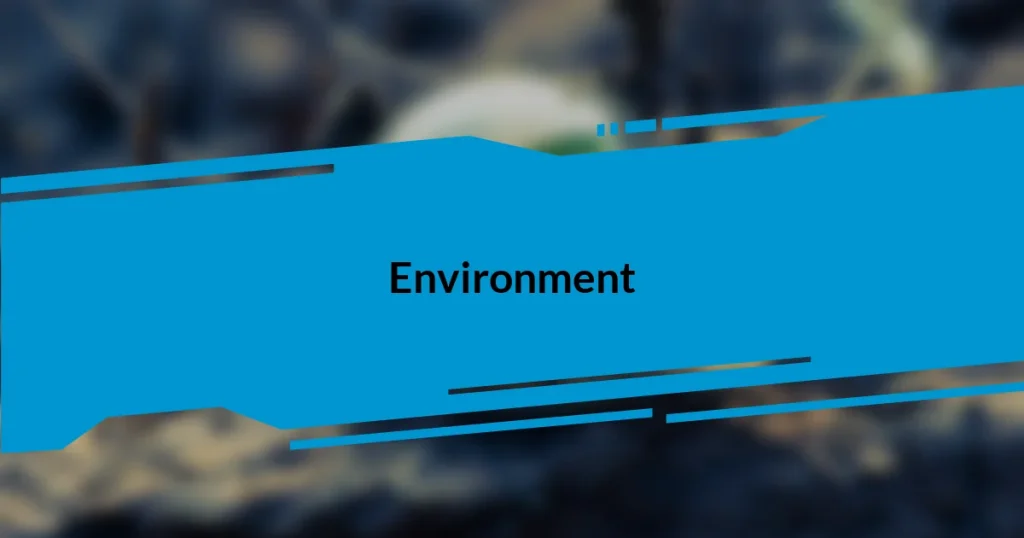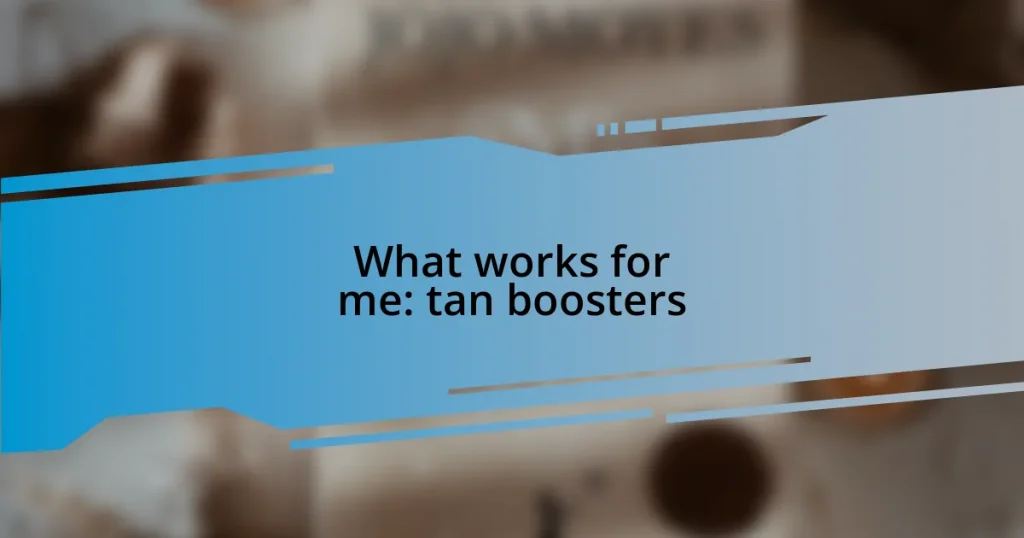Key takeaways:
- Aftercare provides crucial support and community, helping individuals navigate recovery and reinforce personal growth.
- Personalizing one’s aftercare plan—through diverse therapy options, hobbies, and flexibility—enhances engagement and effectiveness in recovery.
- Reflection on progress, challenges, and setbacks fosters self-awareness and resilience, ultimately enriching the recovery journey.

Understanding Aftercare Importance
Aftercare is essential because it provides a safety net in the often tumultuous period following a significant change, such as recovery from addiction or completing treatment. I remember feeling a wave of anxiety when I realized how much easier it was to slip back into old habits without that support. Isn’t it comforting to know that you’re not alone during such a vulnerable time?
When I first engaged with aftercare programs, I felt skeptical about their necessity. However, I quickly learned that having a community to lean on creates a sense of belonging that is hard to replicate elsewhere. It’s like having a built-in cheerleading squad that reminds you of your strengths and encourages you when the going gets tough.
Aftercare also serves as a crucial reminder of our progress. Reflecting on my own journey, I found that each small commitment I made during aftercare reinforced my growth and dedication. So, ask yourself: What would your life look like if you had a consistent source of support to help you navigate challenges? That question alone can deeply influence how we perceive the importance of aftercare.

Key Aftercare Strategies
Key aftercare strategies can significantly enhance one’s recovery experience. I found that establishing a structured routine helped ground me. When I faced tough days, having set times for self-care activities made them feel less daunting. This routine not only reduced anxiety but also encouraged me to prioritize my well-being consistently.
Here are some effective strategies that I’ve found particularly helpful:
- Regular Check-Ins: Scheduling consistent meetings with a therapist or support group keeps me accountable.
- Self-Care Rituals: I began each day with mindfulness practices, which set a positive tone for the hours ahead.
- Goal Setting: Setting small, achievable goals helped me track my progress and stay motivated.
- Building a Support Network: Surrounding myself with others who understand my journey offered solace and insight.
- Engaging in Hobbies: Following my interests not only distracted me from negative thoughts but also reignited my passion for life.
In my experience, these strategies create a resilient framework for navigating the complexities of aftercare. It’s akin to having a toolkit—each tool serves a purpose, making challenges feel manageable and encouraging me to embrace my path forward.

Personalizing Your Aftercare Plan
Creating a personalized aftercare plan is essential for navigating the challenges I faced during recovery. I discovered that tailoring my strategies based on my unique needs made all the difference. For instance, while some friends thrived in group therapy, I preferred regular one-on-one sessions because they allowed me to explore deeper emotions and work through individual challenges. This customization not only made the process more enjoyable but also more effective in supporting my growth.
I remember a time when a friend shared how writing in a journal became her lifeline. Inspired by her, I incorporated journaling into my routine, which helped me articulate my feelings and reflect on my progress. I can’t stress enough how important it is to find what resonates with you. By trying different activities and observing their impact, I learned that personalizing aftercare isn’t just about following a template; it’s about discovering what empowers you on your journey.
In my experience, flexibility plays a huge role in personalizing aftercare. I often adjusted my plan based on what felt right at the moment. For instance, if I noticed that a peer support group wasn’t meeting my needs one week, I’d switch things up and focus on meditation instead. Being open to change kept my aftercare engaging and allowed me to cultivate resilience.
| Element | Personalized Approach |
|---|---|
| Therapy Type | Group sessions for community vs. individual sessions for deeper exploration |
| Activities | Incorporating hobbies that inspire and motivate, like writing or art |
| Flexibility | Adjusting routines based on current emotional needs to stay engaged |

Building a Support Network
Building a support network was one of the most transformative decisions I made during my recovery. I remember the moment I attended my first support group meeting; I walked in feeling anxious and isolated. But as soon as I started sharing my experiences, I was welcomed by understanding nods and empathetic smiles. It hit me then—surrounding myself with people who truly “got” what I was going through made all the difference.
Beyond just support groups, I’ve found that cultivating relationships with friends who are also on their own journeys of healing can be incredibly enriching. We often share our struggles, celebrate our victories, and lean on each other during difficult moments. It’s like having a built-in cheerleading squad that makes me feel less alone. Have you ever considered how powerful it can be to connect with someone who shares similar challenges? Trust me, those connections can foster an environment where we can be vulnerable without fear of judgment.
I also realized that actively seeking out mentors or role models played a pivotal role in my journey. For instance, I sought advice from someone who had successfully navigated the obstacles I was facing. Their insights and encouragement not only inspired me but also provided a roadmap for what could be possible. Finding these mentors was eye-opening. It became clear that building a support network isn’t just about gathering people around us; it’s about creating a circle that uplifts, motivates, and challenges us to be the best versions of ourselves.

Incorporating Healthy Habits
Incorporating healthy habits has been a game changer in my aftercare routine. For me, it started with creating a daily exercise regimen. I still recall how daunting it felt to lace up my sneakers for the first time. But once I ventured out for a brisk walk, the clear sky and fresh air shifted my mood almost instantly. It’s amazing how something as simple as movement can reignite a spark of joy in recovery.
Nutrition also plays a crucial role in this journey. I began experimenting with meal prepping to ensure I fueled my body with wholesome foods. I remember one Sunday afternoon, filled with colorful veggies and grains, as I chopped and cooked—a peaceful ritual that felt almost meditative. Have you ever noticed how the food you consume impacts your emotional state? I sure have. Eating well not only nourishes the body but also supports a clearer mind, making it easier to tackle challenges head-on.
Perhaps the most surprising habit I integrated was mindfulness practice. Initially, I was skeptical about sitting in silence, but during my first attempt at meditation, I felt a wave of calm wash over me. I still find it enriching to step away from the chaos and reconnect with myself, even for just a few minutes. This practice has helped me cultivate resilience. I often ask myself, how can I remain present in tough situations? Embracing these healthy habits has not only anchored me but also added depth to my recovery journey.

Monitoring Your Progress
Monitoring my progress in recovery has been an essential aspect that I can’t overlook. Each week, I set aside time to reflect on the small wins and challenges I encountered. I remember the first time I noted my achievements, even the little ones, like choosing to call a friend instead of isolating myself. It felt empowering to see how far I’ve come, and that habit of tracking my progress has instilled a sense of purpose in my journey.
One technique that has helped me immensely is journaling. I started jotting down my thoughts and feelings daily, and it’s been like opening a window to my inner world. Those pages hold the struggles, triumphs, and lessons learned. Have you ever experienced the cathartic effect of writing? When I look back at early entries filled with anxiety, I often feel a sense of gratitude for how the act of writing has helped me process my emotions and monitor my growth over time.
I’ve also found that involving a trusted friend in this monitoring process adds another layer of accountability. We regularly check in with each other, discussing our goals and progress. At first, I was apprehensive about sharing my vulnerabilities, but seeing my friend express the same fears made me realize I wasn’t alone. It’s fascinating how mutual accountability not only fosters deeper connections but also fuels our motivation. Isn’t it encouraging to know that progress, no matter how incremental, is always worthy of celebration? In my experience, these shared moments make the journey feel less daunting.

Reflecting on Your Journey
Reflecting on my journey has been a powerful exercise in self-awareness. I often find myself pausing to think about the turning points that shaped my path. For instance, I still vividly recall a particularly challenging week when everything felt like too much. In that moment, I chose to revisit old photos and memories, allowing me to appreciate just how far I’ve come. Have you ever looked back to gain perspective? It can be eye-opening.
I also find that discussing my reflections with a supportive friend deepens my understanding of my experiences. One evening, as we sipped tea and shared stories, I realized how bouncing thoughts off someone else can spark new insights. It’s profound to hear how others perceived similar struggles, don’t you think? Those conversations often reveal strengths I didn’t recognize within myself, reinforcing the importance of connection in the reflective process.
Lastly, I’ve learned to track not just my achievements, but also the lessons hidden within setbacks. There was a moment when I stumbled during a critical phase of my recovery, and at first, I felt defeated. But after some reflection, I discovered that this setback taught me resilience and patience. I began to ask myself, what can I learn from this experience? Transforming obstacles into lessons has made my journey richer and more meaningful, underscoring the idea that reflection is not merely a look back but an opportunity to grow.
















